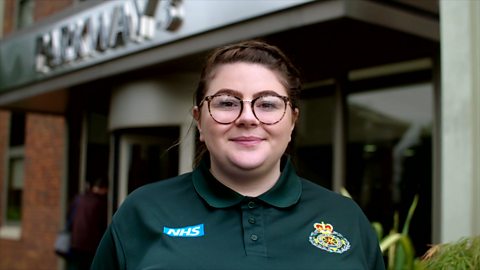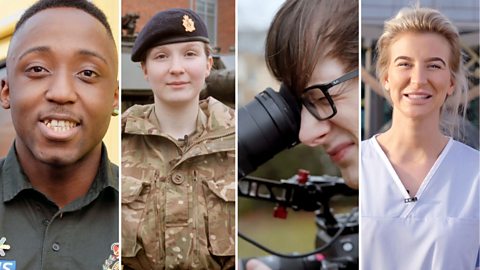Meet Josh, 28, from Edinburgh. He is a podiatry assistant at a private clinic in Edinburgh.
Part of our Bitesize world of work series.
There's so many more things that you can do within podiatry now, it isn't just cutting nails.
My name's Josh and I'm a podiatry assistant.
Josh:
(to patient) If you just want to take a wee seat here, just get your shoes and socks off.
A podiatrist looks after people's hips, thighs, knees, lower limbs, feet and ankle, and it's treating conditions that affect someone's overall health. I'm mostly doing routine care which means that I'm treating people's foot conditions and helping them with surgeries and I also give advice on footwear and their health.
(to patient) What this basically does is it increases the blood flow to the area and it actually promotes a healing response as well and it bypasses that inflammation.
There's so many more things you can do within podiatry now, it isn't just cutting nails. I'd see old people, young people and even athletes as well. We do rehabilitation and we can provide orthotics, which means artificial devices like splints and we can do gait analysis which means looking at someone's body positions, way they're walking, how they're walking.
(to patient) Okay and back down.
Podiatry's such a fulfilling career because you can make a real difference to someone's life. Even with the simplest thing like removing a corn or a callous, can relieve someone serious pain or discomfort that they might be having to deal with or they could've been dealing with for a long period of time.
I left school when I was 16. I was actually a mechanic when I first started work. I went back to college and did a HND in Sport and Hospitality Management. I got trained up in massage as well through Swedish Sport Remedial Reflexology and Taping courses and then I managed to open up my own massage business as well for a while.
After three years of applying for Physiotherapy and not getting in, I got the opportunity to jump on the course for Podiatry where there were extra spaces. So at the age of 24 I started my degree in Podiatry at Queen Margaret University.
Ruairi is the owner of the clinic, was my lecturer in second year and he actually asked me if I wanted to shadow at the clinic as well, which for about six months, I did, and then I got the opportunity as well to start working here. I started two and a half days a week, and now that's me starting full time.
Ruairi, employer
Josh was an excellent candidate for the job and I could tell that he was really interested. He showed lots of enthusiasm, he would ask lots of questions and create educated guesses about some of the patients and their pathologies.
Josh:
(to Ruairi) I'd apply there a medial wedge, just so we can actually get a proper shaping of the foot as well.
It doesn't matter what job you start in, there's always going to be transferable skills like working in massage helped me with my current job because it meant that I was able to communicate with people and I think it's such an important thing with a healthcare role especially because often you'll be with patients for around forty minutes to an hour, so it's really important that they feel comfortable with you.
Patient:
Thank you so much.
Josh:
No, you're very welcome. Thank you very much and I'll see you again soon then, okay, have a lovely day.
I think every adult will probably tell their kid to stay in school for as long as they can, because it's where your probably learn most of your skills like English, maths or sciences as well, and because you know that I dropped out when I was sixteen, it took me a lot longer to get to the point of where I'm at now.
It's true whatever comes to you is probably meant to be, but if you're not sure of your future plans then I'd probably say it's best to stay in school for as long as you can.
- Josh treats patients with routine care by carrying out foot assessments and treating people's feet problems and helping withsurgeries. He also gives people advice on footwear and their health
- Josh also carries out home visits, so he wears his uniform when he's out visiting patients
- He says there are many more things you can do in podiatry than just cutting nails. You can provide orthotics, that uses artificial devices like splits. You can also do gait analysis, which is looking at someone's body position when they're walking
- Podiatrists can treat old and young people, as well as athletes
- Josh left school at 16, went to college and became a mechanic. He then went back to college to do a HND in Sport and Hospitality Management and worked in a private clinic in Glasgow as a massage therapist
- He applied to do Physiotherapy but was not successful and then got a place at Queen Margaret University in Edinburgh to do a degree in Podiatry
- Having an overview of the anatomy from the massage training was really helpful when he started the course.

Top tips
- Stay in school for as long as you can, especially if you are unsure of your future plans
- You will benefit by having English, maths and science skills as these will get you further to where you want to be.

What to expect if you want to be a podiatry assistant
- Podiatry assistant average salary: NHS bands [2-3]. Read more about NHS bands. Salaries will differ in private healthcare.
- Podiatry assistant typical working hours: 40 to 42 hours per week, which could include weekends.
What qualifications do you need to be a podiatry assistant?
You could get into this role via a college course, an apprenticeship, working towards the role, applying directly or specialist courses run by private training organisations.
Sources: LMI for All, National Careers Service, NHS Health Careers
This information is a guide and is constantly changing. Please check the National Careers Service website and the NHS Health Careers website for the latest information and all the qualifications needed.
For careers advice in all parts of the UK visit: National Careers Service (England), nidirect (Northern Ireland), My World of Work (Scotland) and Careers Wales (Wales).


The Open University and BBC have been working in partnership for over half a century to provide a unique public service offer covering all four nations of the UK. Each year the OU co-produces a wide range of content for television, audio – radio and Sounds, digital and social with the BBC, including BBC Bitesize.

Careers in healthcare. collection
A collection of stories from people working across the healthcare sector.

Explore healthcare careers with the OU. External Link
THE OPEN UNIVERSITY

More from Bitesize Careers
Hear from young people about the world of work.

